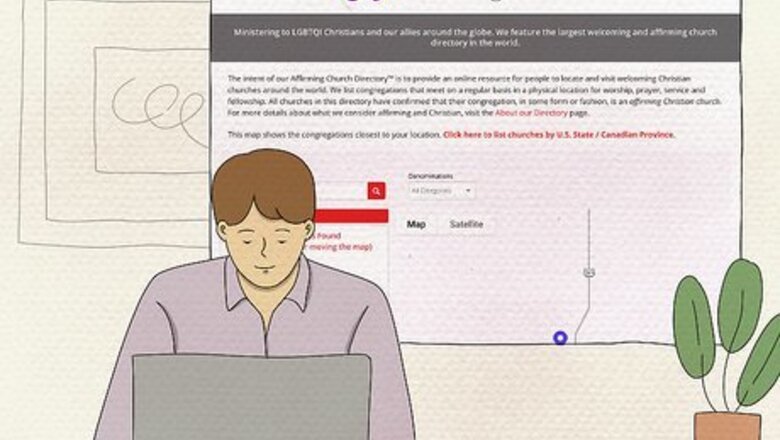
views
Finding Community
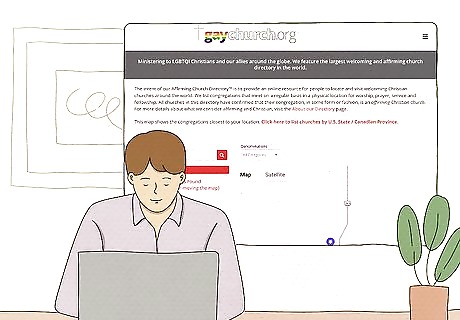
Find an affirming congregation. Find community in a church that affirms your orientation. There are congregations of even the most traditionally homophobic denominations that declare themselves "Affirming" or LGBTQ friendly. Acceptance and affirmation has grown among most U.S. Christian groups, and over half of U.S. Christians accept gay people. Search for churches in the Affirming Church Directory: http://www.gaychurch.org/find_a_church/ Most denominations have gay-friendly churches, but you might have luck with a UCC, Quaker, or Unitarian Universalist church. Look for churches that have LGBTQ affinity groups, Gay Straight Alliances, mentoring programs for queer youth, and diversity-affirming committees. Consider finding a church with an LGBTQ pastor. If there are no congregations near where you live, consider streaming online church services from a gay-affirming church and participating in related message boards.
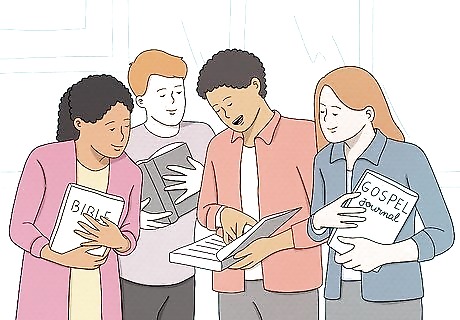
Connect with other LGBTQ people of faith. It can feel like you have to choose between having a faith community and a queer community, but you don't! In the United States, almost half of gay and lesbian people identify as Christian, while many more belong to other faith traditions. Consider joining an interfaith group for gay people.
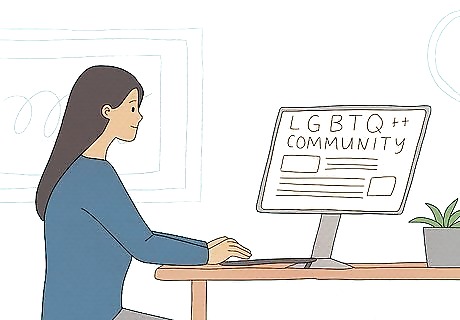
Join an online community. If you are living in an isolated area, or if you are unable or afraid to meet other gay Christians in person, look online. There are infinite message boards, social media groups, and websites for gay Christians. Just search for what you are looking for, make some friends, and ask all your burning questions. Find a general LGBTQ friendly message board and start a discussion about faith.
Coming Out

Come out to potential allies first. If you are working on coming out of the closet, start by talking to people who you think will support you. If you know any gay people, start with them. People who you know to be liberal, radical, open-minded, or simply thoughtful are also good candidates. If you don't know anyone like this, practice by talking it through with your online community.
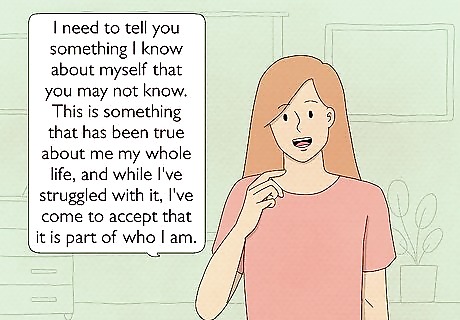
Come out to your family. Be open about your orientation to your family if you safely can. You may want to talk to one family member first, or you may just want to talk to a few of your closest relatives as a group. Say something like "I need to tell you something I know about myself that you may not know. This is something that has been true about me my whole life, and while I've struggled with it, I've come to accept that it is part of who I am." Reassure them that you know what you are talking about, that you have always been gay, and that you are still a Christian. Offer helpful materials. Look for materials meant to support Christians with gay family members. If you are a minor who lives at home and is financially dependent on your family, consider waiting to come out until you are able to support yourself. If you live with homophobic family members, have a backup plan before you come out, or if you fear being outed. Locate a shelter, or ask a relative or close friend if you can stay with them if you are left homeless.
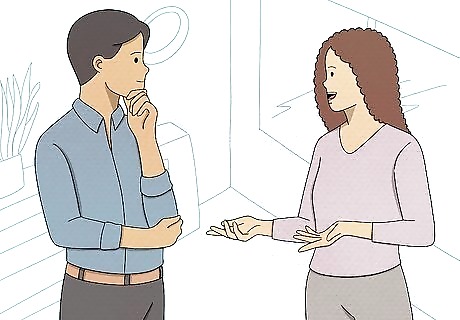
Ask your pastor for help. Speak to your minister to see if you can count on them for support. If you are coming out to your family or members of your community, having your faith leader in your corner is essential. If your family attends a different church, consider speaking to their pastor. Only do this if you have attended the church before, or if you have your family's permission: otherwise they may feel violated.
Standing Up for Yourself

Assert your identity. One simple way to be openly gay is to refuse false labels. People who do not know your orientation or who refuse to accept it may refer to you as straight. Gently and firmly correct them. If they say, "Sondra is going to make some lucky man very happy someday," you can counter with, "I'm not attracted to men, actually. I might make some lucky woman very happy someday, though!" Be open about your relationships. Do not let people refer to your partner as your "friend." Say, "Ben is my best friend in the world, but he's my partner of four years. Please refer to him as my partner or my boyfriend."

Argue if it feels worth it. If your family members or close friends are engaging you on the topic but still have reservations, go ahead and argue with them. Listen to them respectfully, and ask them to do the same for you. If they say you're confused, rebelling, or have "chosen" to identify as gay, all you can do is say that you understand why they think that, but it's not true. Tell them they have to trust you. If they say you are sinning, you can explain why you think you aren't, but acknowledge that it is not for you or them to judge. If your family is worried that gay love is a sin, it's up to you how much you care to share with them. You don't have to say anything at all. If you are only planning on having sex within the bounds of marriage, or remaining abstinent altogether, you can offer that up as a kind of chastity the Bible supports. If you aren't, point out that the Bible is against all sorts of lust, and doesn't really account for most contemporary partnerships. Don't get sucked into endless arguments about the Bible and gay love with anyone who harasses you. You don't have to defend your orientation: you are who you are.

Counter Biblical arguments. While interpretation of the Bible varies over time and between denominations, many Christians rely on a few short passages to condemn gay people. You may want to point out the many passage of the Bible we don't follow to the letter, or you may want to engage them on the interpretation of the passages in question. Remind them that Genesis 19 is about the gang-rape of angels, and actual gay people are never mentioned in connection to Sodom. Point out that Romans 1:26-27 and Leviticus 18:22 and 20:13 are about teaching against worship of false gods, and that context may explain the language about gay sex. If they bring up I Corinthians 6:9 or I Timothy 1:10, tell them the translation of the Greek words "malakos" and "arsenokoites" as "gay" is controversial, as that meaning was rare when the words were most common. Remind them that Christianity is, at its core, about love and acceptance of one another and treating others with respect and dignity.

Be a good ally. Being a gay Christian can feel like enough work on its own. You may feel excluded from the broader LGBTQ community, or like your concerns aren't shared by many gay people. Learn to accept that you are a part of the broader queer community, and do your best to have empathy, compassion, and understanding of the diversity of concerns that encompasses. Don't be shy about your faith around other LGBTQ people. Remember, half of them are Christians, and a lot of the rest practice other faiths, are spiritual, or love people who are religious. Accept and affirm transgender individuals. They are the most vulnerable portion of the LGBTQ population. Apply intersectional thinking to your activism. As a gay Christian, you understand that no single identity category suffices to define one's position in the world. Consider the unique positions of LGBTQ people who are people of color, who are disabled, who are first-generation college students, who are refugees…
















Comments
0 comment